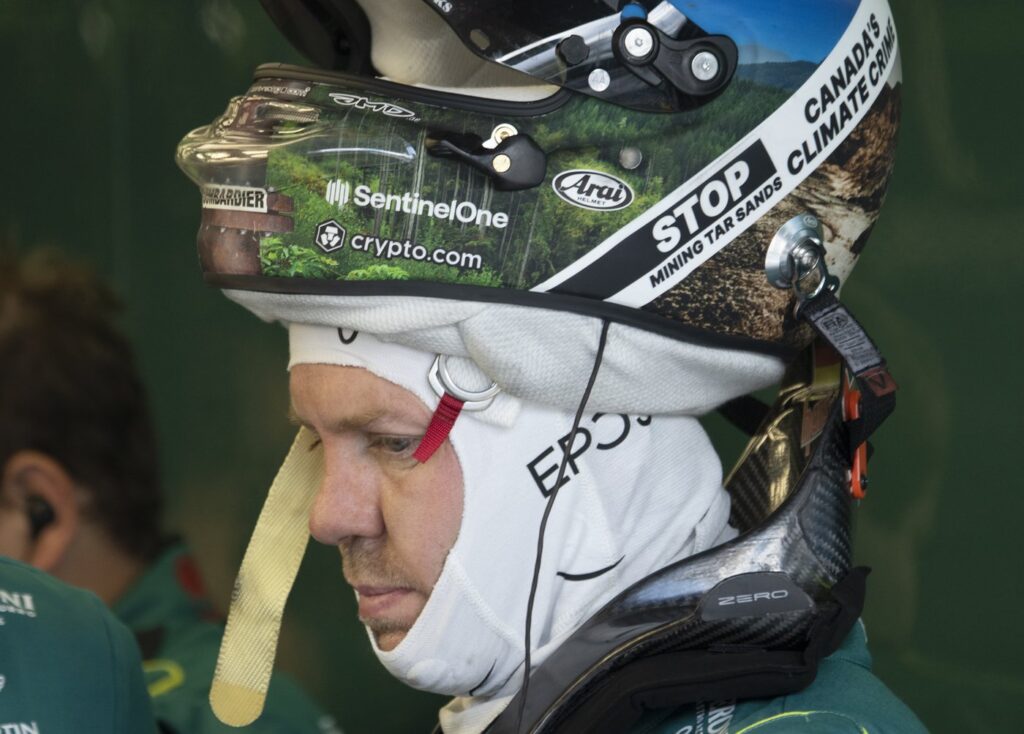
Aston Martin Formula 1 driver Sebastian Vettel, of Germany, wears a patch on his helmet denouncing Canada’s oilsands during the first practice session at the Canadian Grand Prix, in Montreal, Friday, June 17, 2022. Premier Jason Kenney says he’s not losing sleep over an F1 driver’s protest against the Alberta oilsands during last weekend’s Canadian Grand Prix in Montreal. THE CANADIAN PRESS/Ryan Remiorz
WASHINGTON — The “over-the-top hypocrisy” outspoken Formula One driver Sebastian Vettel displayed on his T-shirt and helmet last weekend in Montreal is just the sort of thing Premier Jason Kenney says he needs to disprove and discredit the critics of Alberta’s oilsands.
Kenney visibly relished the chance Thursday to denounce Vettel as a hypocrite after the German driver showed up at Circuit Gilles Villeneuve for the F1 Canadian Grand Prix in a T-shirt that described the oilsands as “Canada’s Climate Crime.”
Vettel also wore a specially designed helmet during practice and qualifying sessions Friday and Saturday that featured the same slogan, along with pipeline graphics and images of natural forest juxtaposed with a post-industrial wasteland, and the message, “Stop Mining Tar Sands.”
“I am happy with what Sebastian Vettel did, because I think … it’s almost like a cartoon caricature of hypocrisy,” Kenney said Thursday during a visit to the U.S. capital, where he’s part of a delegation that’s trying to rehabilitate the public image of Alberta energy.
Vettel drives for Aston Martin, which is supported by Saudi Aramco — a Middle Eastern petroleum giant with “probably a higher carbon footprint than virtually anybody on the planet,” Kenney said.
“I think is a perfect learning moment for us to say that the opposition to the oilsands is coming from people who do not have an inkling about what we do, and are often covered in hypocrisy.”
Kenney took part Thursday in a roundtable discussion at the Wilson Center’s Canada Institute with members of the Pathways Alliance, a consortium of oilsands producers behind a multibillion-dollar carbon capture and storage project they bill as a potential game-changer.
The ultimate goal is to turn Alberta’s oilsands production into a net-zero operation by 2050 by capturing the emissions produced by burning natural gas and storing them deep in the spacious and porous geography of Canada’s Prairies.
The more short-term objective, however, is to shed the reputation the oilsands have earned as a purveyor of “dirty oil” and make more U.S. lawmakers aware of Canada as a viable, stable option for their country’s immediate fossil-fuel needs.
Those needs, Kenney said, are especially acute as motorists contend with soaring gasoline prices, along with record inflation levels, supply-chain pressures, labour shortages and other longer-term symptoms of the COVID-19 pandemic and the war in Ukraine.
“They’d rather solve that problem with Canadian energy than Saudi or Venezuela or dictator oil,” he said.
“So I think we can appeal to the vast majority of Americans and people on Capitol Hill, but some of them simply need to know that we are serious about reducing emissions and we respect the environment.”
It won’t be cheap: officials say the industry expects a final tab of about $2.5 billion a year between now and 2050, including roughly $20 billion to meet an initial target of storing or otherwise eliminating 20 million tonnes of emissions by 2030.
Cenovus Energy CEO Alex Pourbaix said the timeline breaks down roughly into three segments, with the first being dominated by carbon capture and storage. New, less energy-intensive methods for extracting bitumen will make the industry less dependent on natural gas over time.
Those include small-scale nuclear reactors, known as small modular reactors, as well as burning hydrogen instead of natural gas to generate the steam that’s used to liquefy the bitumen, and replacing the steam entirely with solvents, such as butane.
“We have a goal of de-connecting the production of oil in the oilsands from the emission of CO2,” Pourboix said.
“If we’re able to do that, I think we really make a compelling case that Canadian oil should be the preferred barrel of oil certainly for U.S. imports, but we would argue worldwide.”
This report by The Canadian Press was first published June 23, 2022.
James McCarten, The Canadian Press
- 0113 Miller Epic Cinematic Hollywood trailer0113 Miller Epic Cinematic Hollywood trailer
- 0111 2026 SK Oil Show booth promo 010111 2026 SK Oil Show booth promo 01
- 0085 Turnbull snow removal call office0085 Turnbull snow removal call office
- 0110 SaskEnergy SEI_Network_Members_Burn_Brighter0110 SaskEnergy SEI_Network_Members_Burn_Brighter
- 0105 SaskEnergy Commitment to Safety0105 SaskEnergy Commitment to Safety
- 0102 Lori Carr Coal Extended0102 Lori Carr Coal Extended
- 0100 Turnbull Project Manager0100 Turnbull Project Manager
- 0099 Mryglod Steel 1080p0099 Mryglod Steel 1080p
- 0097 Eagle Sky Ventures LTD0097 Eagle Sky Ventures LTD
- 0095 Fast Trucking nearly 70 years good at it0095 Fast Trucking nearly 70 years good at it
- 0092 Turnbull projects big and small0092 Turnbull projects big and small
- 0046 City of Estevan This is Estevan Teaser0046 City of Estevan This is Estevan Teaser
- 0077 Caprice Resources Stand Up For Free Speech0077 Caprice Resources Stand Up For Free Speech
- 0061 SIMSA 2024 For Sask Buy Sask0061 SIMSA 2024 For Sask Buy Sask
- 0051 JML Hiring Pumpjack assembly0051 JML Hiring Pumpjack assembly
- 0049 Scotsburn Dental soft guitar0049 Scotsburn Dental soft guitar
- 0041 DEEP Since 2018 now we are going to build0041 DEEP Since 2018 now we are going to build
- 0032 IWS Summer hiring rock trailer music
- 0022 Grimes winter hiring
- 0021 OSY Rentals S8 Promo
- 0018 IWS Hiring Royal Summer
- 0013 Panther Drilling PO ad 03 top drive rigs
- 0002 gilliss casing services0002 gilliss casing services
- 9002 Pipeline Online 30 sec EBEX9002 Pipeline Online 30 sec EBEX
- 9001
